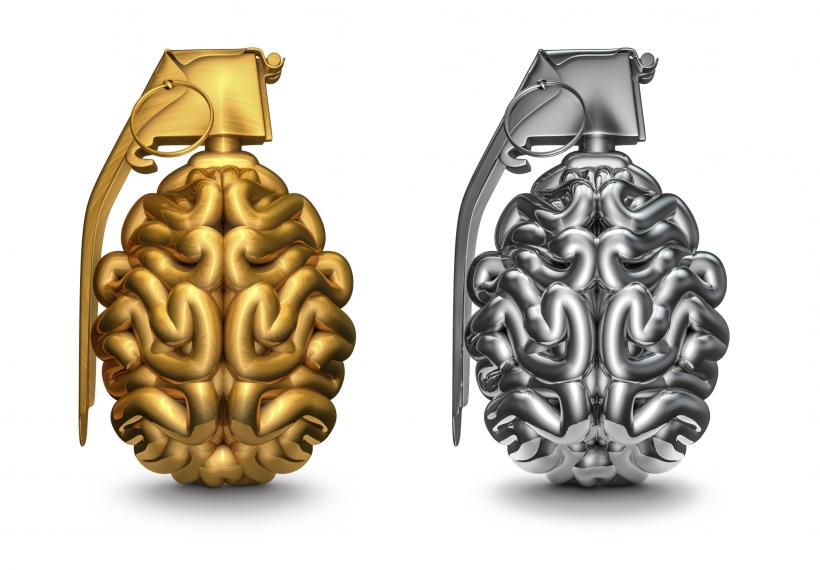
Image: Thinkstock.
In perhaps the most depressing news of the week (and even more depressing because it's not "news" at all, as we humans love to slaughter), the planet earth is currently engaged in 538 wars raging across 61 countries.
As a small sampler of civilization's penchant for war-mongering, in the 22 countries of the Eastern Mediterranean, over 85% of the population is either in a current conflict situation or has experienced conflict in the past two decades. Oh, and Africa alone makes up 156 of the world's current wars.
A ongoing photography project by Jeanine Michna Bales called Fallout documents Cold War-era fallout shelters. And it got our gears turning on what the psychological effect all this blood, death, fear and um, potential annihilation is having on the human psyche. Are we wreaking havoc on our own minds? And just how long have people been studying the psychological fallout of war (on soldiers and civilians alike)? Most importantly, what the hell are we doing about it?
Some of the photos have Cold-War-era government documents or newspaper articles superimposed on top, like one that details what percentage of the population would die if a bomb exploded on the surface nearby. Everyone less than a mile away, it says, would perish. Up to 60 percent of the people within a three-mile radius would also fall victim. Only those who were at least three miles away stood a good chance of surviving. — Jakob Schiller, Wired.com
The shelters remain haunting time capsules—many still include canned food and furniture—serving as a stark reminder of a generation's uncertainty about the very future of the human race. Death is one thing; death en mass as an entire species is quite another. In many ways, war is not only a consistent reminder of what we're capable of, but an existential reminder that everything—the entire world—is all too fragile.
Here's a quick and dirty round-up of a few findings on the psychological impact of war. PTSD symptoms are marked by everything from hyperarousal (difficulty sleeping, angry outbursts) to depression, guilt, chronic nightmares and dread.
Psychological Effects of the Threat of Nuclear War, Canadian Family Physician
►Psychological morbidity has been correlated with work deprivation and threat of annihilation.
► JH Masserman blamed the arms race for economic hardship causing unemployment and a deterioration in group morale and individual and national self-esteem, correlating psychiatric morbidity with work deprivation. So did Philip Brenner, who reported there was a 1% rise in unemployment associated with a 5.7% rise in crime rate, 3.4% more hospital admissions and a 4.1% increase in suicides.
► In 1986, four researchers from the Children's Mental Health Research Group at the University of Toronto examined 1,011 students in grades 6-13 and discovered that, for children 12-18, their greatest worry was nuclear war. "The psychopathologists conceptualized the arms race and its effects on humanity as not only dangerously inhuman, immoral and ignorant but also pathogenic," i.e. mental disease-causing.
►People doubted their own future, doubted the planning of families, doubted the future of human society, and doubted the meaning of the existing world, since a nuclear bomb exploding would easily destroy everything. These people felt a sense of helplessness and vulnerability. (Xi, Xie)
Mental health consequences of war: a brief review of research findings, World Psychiatry
►Conflict situations cause more mortality and disability than any major disease.
►Non-death consequences include endemic poverty, malnutrition, disability, economic/social decline and psychosocial illness.
►10% of the people who experience traumatic events will have serious mental health problems and another 10% will develop behavior that will hinder their ability to function effectively. The most common conditions are depression, anxiety and psychosomatic problems such as insomnia, or back and stomach aches.
A Breakdown by Country and Conflict
► In Afghanistan, out of 799 adults, 62% percent of respondents reported experiencing at least four traumatic events during the previous 10 years. Symptoms of depression were found in 67.7% of respondents, symptoms of anxiety in 72.2%, and post-traumatic stress disorder (PTSD) in 42%.
► In Cambodia, a household survey of 993 adults from Site 2, the largest Cambodian displaced-persons camp on the Thailand-Cambodia border, found that more than 80% felt depressed and had a number of somatic complaints despite good access to medical services. Approximately 55% and 15% had symptom scores that correlated with Western criteria for depression and PTSD, respectively.
► In Iraq, there are—strangely—very few studies on the impact of these conflicts on mental health. A study on 45 Kurdish families in two camps reported that PTSD was present in 87% of children and 60% of their caregivers.
► In Palestine, a study conducted by the Gaza Community Mental Health Programme among children aged 10-19 years revealed that 32.7% suffered from PTSD symptoms requiring psychological intervention, 49.2% from moderate PTSD symptoms and 15.6% from mild PTSD symptoms
So, there ya have it.






